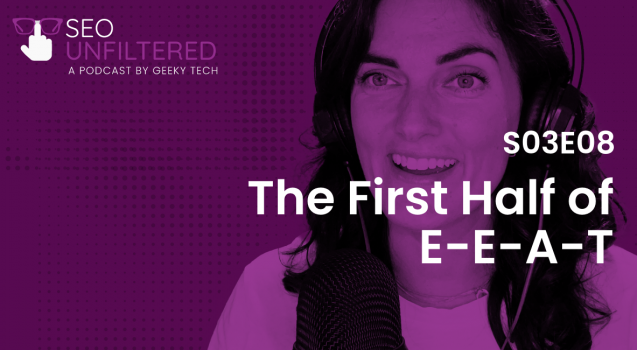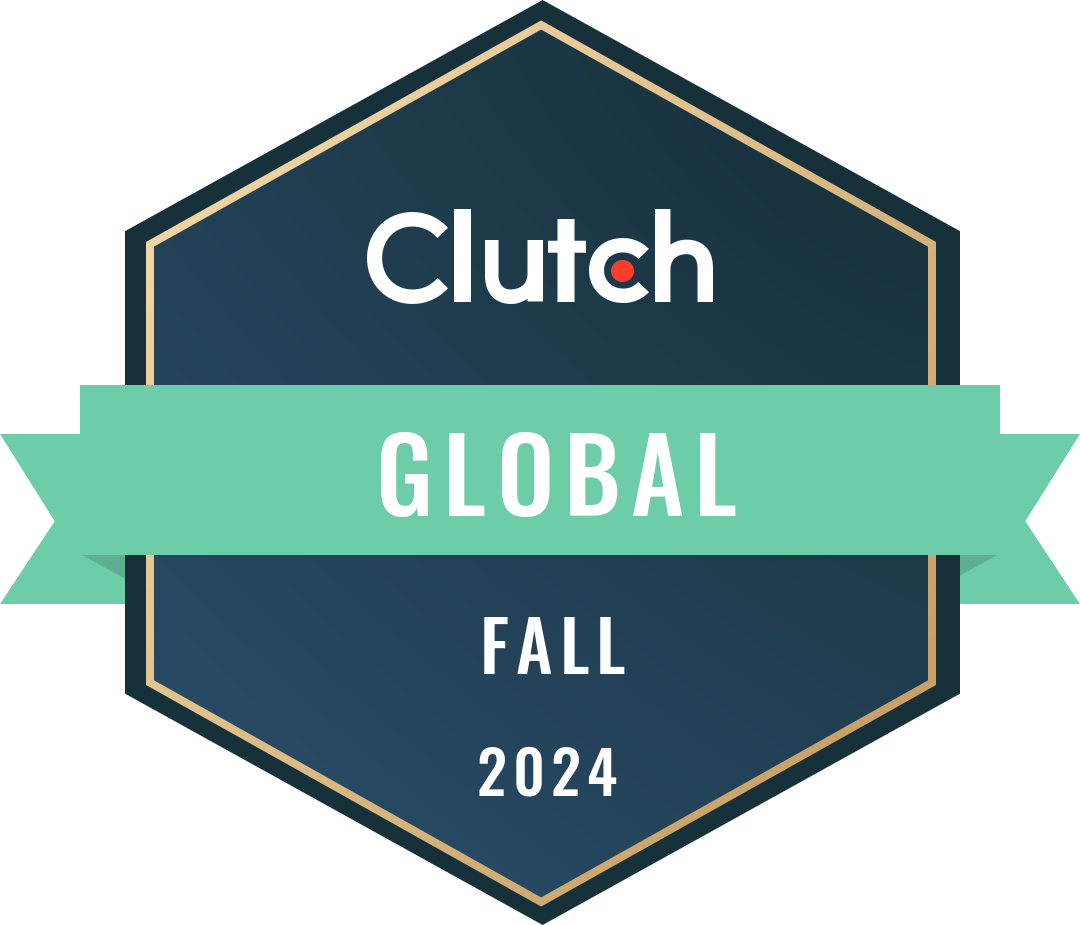Transcript
[00:00:00] Genny: Last month we went full geek to discover what the heck is going on in the AI world and why the hell Google is so up in arms about ChatGPT. Well, things move fast in the industry, which means that by the time we aired our last episode, most of the discussion around ChatGPT was already out of date.
Podcast production schedules being what they are. We decided to air at the episode anyway because, well, Of all, it’s such a bitch to record. And second of all, it’s still all anyone can talk about for crying out loud. And here we are again today talking about chat, G P T. So there you go. God, if ChatGPT were a person, it’d be that nerdy girl in art class who suddenly took off her glasses and dunes only to turn into the hottest girl in the room.
Every day there’s something in the news about this subject, which means that obviously the public has become obsessed. Just the other day, I tried logging into G P T only to be refused at the door by the digital equivalent of a bouncer with too much power in his clipboard. I tried waiting in the queue for as long as possible, but like every other self-respecting woman who’s been refused entry into a nightclub, I left the queue, went home, and cried myself to.
I’m just kidding. But back to the topic at hand, last month’s episode about how ChatGPT was going to be your future marketing assistant has kind of opened up a can of worms, at least for us. Since then, we’ve had people asking us if they could use AI to generate new content for them. We’ve also had clients who have already asked us to optimize pages written entirely by ai.
So I’ve asked Joe onto the show again to explain why this is putting the cart before the horse. So Joe, just to summarize, last month’s episode you mentioned that chat, d p t, or AI generated content is already out there and that corporations are using it, albeit with a big, fat, juicy disclaimer so that just in case the information they push out is incorrect, negligent, or just plain old, stupid, they can go ahead and blame the robots.
So let’s set the record. . We know that AI chat bots like ChatGPT can churn out some pretty impressive content in a matter of seconds, but does that mean that we should be using it to write our content?
[00:01:55] Jo: Uh, in a short answer, no. I don’t think that you should be using chat, g p t or, um, uh, generated, um, large language models, uh, output for, uh, straight up content generation just.
Okay. I think it works there. Still works very well as an assistant. So again, you can, uh, use it to help you. You can use it to help you create ideas or to summarize things or to create titles or help you create, uh, meta descriptions. Or in the case of large websites where you have like an e-commerce site where you’ve got a lot of product descriptions that kind of need to be, uh, unique.
Um, it makes those jobs a lot. , but I think for like kind of long form content, it’s, um, not, not, uh, brilliant just yet. Um, again, uh, it is just re jumbled uh, words, so Okay. You are never gonna get anything completely unique from it. Yeah. So although it’s, it may sound good and it’s, uh, everyone loves quick and easy.
Um, it is not quite there yet, but you know, in the future, um, who knows, it may. . Okay.
[00:03:08] Genny: Okay. Um, but maybe I’ll ask you this later, but when you say you can use it as an assistant, I’m curious to know what you mean. Like where do you draw the line? Like how much does it help you or how much does it do versus how much do you do?
Um, like do you get it to write the page for you and then you heavily replace what it’s saying with your own words or?
[00:03:31] Jo: I think that comes down to the writer and, and. , um, they feel comfortable with and what they feel, um, the quality of the output is. Okay. Um, I think if you’re, if you’re a writer, then you take pride in whatever that you, uh, send, send out into the world.
Mm-hmm. . . So I think as using your own judgment, are you proud of what you are? Uh, what, what, what you have produced or are you not? Do you think it’s, you know, um, generic or repetitive or, okay. You know, could you make it better? Um, I, I dunno, an assistant, if you are struggling with ideas, I think, um, for something like that, then it can, uh, kind of get the creative juices flying.
Okay. , I guess. Um, and then once you’ve got that, then you kind of take over using your own, um, your own brain, um, to, to write. But, uh, yeah, and I think there are, uh, a lot more tools coming out to, to kind of cater for the, the creative writing space, um, things like that. Oh,
[00:04:31] Genny: okay. Um, I mean, but based on, I, I believe that we are running tests with AI right now.
So what are we seeing at the moment with AI generated content? .
[00:04:43] Jo: So we have been running generated content for, or personally we’ve been running at Forewell over 10 years, . Um, so there’s nothing kind of new with, um, this. This kind of, uh, generated content. Um, obviously it’s gone through stages where there’s a, you can say a lot of, um, taking it from kind of the spinning where you take out single words and replace single words.
Yeah. To synonyms or, you know, that kind of thing. Or, um, mixing around sentences and, you know, that kind of, uh, generated techs we’re using things like mark of change, trying to predict what the next word would be. They’re very, very, um, old concepts. Okay. And they’ve been heavily. Uh, tested, um, in, in, you know, years and years, um, whether they get into the index, whether you can, uh, once they’re in the index, can you rank them and things like that.
And, you know, you can produce literally millions of pages of, of this kind of content. And there are many tools that will, um, you know, go out and do that for you. Um, this is, uh, I think the next one that came through was the paraphrasing part of it, right? Where you could paraphrase very well mm-hmm. , um, you could take someone else’s, uh, copy and paraphrase it, and then pass it off in, in, pass it off and get it, then get it indexed in Google and you can even rank that as well.
Okay. Um, to now where you can, um, generate whole articles where you can just, you know, a click of the button, um, say I want an article on this, and it will produce it for you. Mm-hmm. again. I mean, you can get it indexed, can you rank it? Most of these things you need to be very, um, you can’t, how do I say this?
You can’t rank straight up human content. What, what do you mean by that? Generally, straight off the bat. Like if I just went up to a random person and said, could you write me an article on, um, uh, old school skating? Yeah. Um, would that content then rank in Google? , I thought, you know, probably not. It’s the same with, uh, G P D three or uh, G P T, uh, chat.
G p t. Mm-hmm. , um, that, you know, it can produce content on it. Okay. Um, whether it’s seo, you know, seod content is a, is a different question. Right? Um, you know, well, does it use the language? Does it use the right. Bits and pieces here and there. Yeah. But so, so for Tess, you know, we, we can see, we can index it with no problem.
Um, we can rank it as well if we go in and SEO it. Um, however, we, again, we don’t recommend doing that just because in the future you never know what, what’s gonna happen
[00:07:22] Genny: with it. Well, that’s what I was gonna ask from an SEO perspective, why shouldn’t we be publishing AI content right now? This is all in the context of.
at the moment, cuz I know this thing is evolving so quickly, but at the moment, why is it, why don’t, as don’t, why don’t we recommend it as an SEO agency? Number
[00:07:41] Jo: one, it’s mediocre content . Okay,
[00:07:44] Genny: fair enough.
[00:07:45] Jo: You know, if you are, if you want to be a leader in your field mm-hmm. , then you don’t want mediocre content on your website.
Okay. Um, because that’s what, you know, that’s what you are presenting to the public is a, is a isn’t, I’m gonna say half ass bit of content. Um, which, which, you know, you don’t want, you don’t want to present that to the world. Right. Um, you want, you want to be an expert in your field and so you would want to pro produce expert content.
Mm-hmm. . Yeah. Makes sense. Um, unless it’s something. , uh, unless it’s something lar uh, you know, larger websites, again, going back to e-commerce, something like that where it’s product, product descriptions, something kind of, not generic, but no thought has ne has been needed to put into that. Mm-hmm. , you know, as you’re describing a product and you need to do them on, you know, a lot of Esq is whatever, but, you know, you gotta do thousands or, you know, two thousands and then it might be a good idea to, to come up with a template for that.
Um, but there, there’s nothing changed with that. As before, the e-commerce, you would have a template anyway, and then you would just change out the words. Now with, um, chat GBT or you know, the, um, GBT 3.5, uh, the api, you can, uh, hook that up and actually not just use a template, but change out that template to, uh, to sound a little bit
[00:09:01] Genny: better.
Okay. The other thing that’s come up a lot is this whole idea that if the content passes some kind of. Test tool, then it should be okay to make it public. So is that, what’s the deal with AI detection tools? , .
[00:09:16] Jo: So Google put a research paper out, um, I think like two years ago or something. Okay. Like that. So basically they were looking into how to detect, uh, AI content, uh, or, or contemporary by, or content generated by mls.
Yeah. Um, and so what they found is, okay, yes, they can detect it. Um, , no problem with that. They also found that, um, they can identify low quality content, human written, low quality content by using the same thing. Mm-hmm. . So what might have happened is that they’ve used that and over the years progressed on it and it has turned into what’s one of the, uh, latest updates was called the helpful Content update.
Right. Um, which did hit AI sites like pure generated AI sites. Um, but it’s probably not an ai, um, not against ai. It’s probably against, um, poor quality content. Well, you know, unhelpful content. Um, that’s one possibility. Um, but anyway, so Google has the ability to detect AI content. Mm-hmm. , whether they, and, and, and they do, uh, classify all of the content, whether it’s helpful or unhelpful.
Um, the tools that are popping up at the moment, I mean, open AI have got their own, um, AI detection tool out now. Um, large, like plagiarism tools, copy leaks. Yeah. Uh, they also have the one, um, they’ve been, uh, they’ve been around for a very long time. I mean, there’s, uh, lot of free ones, uh, like, uh, glitter.
She’s basically, they look at the prediction of the next token. Okay. So basically the. . Yeah. The way that, uh, G p T works is that it, it kind of splits, um, words into or sentence into, into little tokens. So about three, three to, uh, four space, four, uh, characters. So, and then it tries to predict what comes next.
Mm-hmm. , um, using a massive, um, uh, information. Um, and what the detective does is it looks at what the predictability is of the next token. So if you. . If, if you are writing at kind of like a , a very predictable way, it will be able to pick up on that. Mm-hmm. . Um, and at levels where you can only constantly write at a high prediction, um, mice probably means that you are using an AI
[00:11:44] Genny: or you have no imagination.
[00:11:45] Jo: sorry. Well, no, you, but it’s, it’s, it’s not imagination. It’s like, it, it’s, how do you describe it? It’s like, okay, if you have the word, maybe we can, or something. Mm-hmm. , it will split up in ma y and then it will look at all of the other content that he knows about and look at the previous sentences and try and predict what’s next.
So you might have typed in ma but then it will then predict the next letters will be ybe space. Um, and so it is not exactly the words, but it’s the, the, the token. . Mm-hmm. . Um, yeah. And so it’s not really about being creative, it’s just about the, the predictability of the next token. Okay. Um, and nobody can write human, human beings.
There’s a, there’s a very large dis, uh, gap between what humans write and what, uh, AI write. Okay. Um, obviously that could be faked and, um, changed around Right. Quite easily. Um, but, uh, at the moment, most of these tools would work off of that with everybody using chat tbt. They’ve, there’s been a lot of, um, AI detection tools popping up as well.
Things like, uh, originality, ai, and as I said, open AI brought out their own one and hugging face, uh, uh, have also got theirs. Um, but again, none of these are Google. Mm-hmm. . So even if they do. Put the past this test, it doesn’t really mean anything.
[00:13:16] Genny: Oh, God. Waste.
[00:13:19] Jo: Yeah. So a lot of these, okay. A lot of these companies are probably, um, profiting off, off fear of, yeah.
Uh, Google Slap, I guess. Um, just because something passes, uh, some made up test doesn’t, doesn’t give it any more credibility than, than any, any other bit of work. Um, but I guess it’s trying to keep your writers, I’m not honest, but trying to keep your writers. Okay. Like if you can definitively show that this is AI generated content and they’ve sold it to you as human written research content, then obviously you’re gonna have an issue with that.
Right. And, uh, we struggle with that every day. Yeah. Um, I’ve seen a couple of other tools out there that, um, force writers to use. Um, a, a bit like Google Docs where you have a history, but this one’s a bit more precise, where you can, um, literally ask your, ask a writer to write in it so you can see every, everything that’s been typed.
So it’s, it’s a bit like a, a key logger. Um, and then he’ll give you a percentage of what has been copied and pasted into a document. Um, and then, then it’ll give you a certificate to say that you’ve written it all out. Mm-hmm. again, it’s come to this a bit too much and I think. I don’t think writers would stand for that.
I think that’s way too much. Um, it’s like screenshotting, um, you know, those time Yeah. Timer things where they screenshot people and things like that. I think it’s, uh, that trust part is, is, uh, gone a bit too far. Right. Also, it’s so easy to. To fall because you can just have two screens and you can just type out whatever the AI says and then you’ve passed it a hundred percent.
It’s a bit giving people tips. , what hell here, but so, so yeah, I wouldn’t put much. Um, I mean, if you are paying for a writer to write something mm-hmm. and you say, oh, and I don’t want AI content, it’s great for that. Um, you push it through here, but I wouldn’t be paying for it. Things like, again, open ai, have one that’s free.
Um, copy leaks. Also have a version that’s just free and, uh, glitter, um, which is probably what most of the other ones are based off. Okay. Is also free. So, um, I would just check out those and run content through there. But again, if it’s, if you’re not writing it, you don’t inci. If you’re not publish. for Google.
Um, then there’s no reason why it can’t be AI content. I
[00:15:41] Genny: think, you know, the reason why I ask that is because a, a few customers have been like, oh, no, no, it’s fine. It passed a, an AI test. It’s like it didn’t get detected or whatever. And we’re just like, well, you know what? I, not sure if there’s like, that’s the point, so, yeah.
[00:15:55] Jo: Yeah. No. Yeah. And, and again, it doesn’t, I’ll say this, it’s, it’s also about the quality of, of
[00:16:01] Genny: content. Yeah. That goes out because that more, that’s more important, right. .
[00:16:05] Jo: Yeah. Like if it’s, if it’s sustained, like okay, you’ve been given some suggestions by ai Yeah. And you’ve researched it and written it, and it’s a good piece.
Mm-hmm. , it doesn’t matter if like three or four, um, parts of it come from ai mm-hmm. , um, as long as it’s a, a a, I suppose helpful, I think is the , the, the term that you want to
[00:16:24] Genny: use, but even. Just ChatGPT, all the information you get is two years old. So clearly if you’re writing about something that has like a very, uh, quickly evolving technology, you don’t really wanna rely so heavily on that.
Anyway, sorry. I just thought of that. .
[00:16:41] Jo: Um, yeah, well the age thing is, is is difficult now with like being chat and things like that where they have pull out, um, sources and things like that, then it becomes less of an issue. Mm-hmm. Um, but yes, you’re right, it is old. It’s also. , uh, repetitive. Yeah. So maybe if you ask it the same question or you ask it to write an email, you might constantly be starting to write, um, using the same sentences again and again.
So funny. Um, yeah. And you start off all your emails with dear, so I hope your something’s happen. I hope this
[00:17:13] Genny: email finds you well. I hope this see
[00:17:15] Jo: finds well .
[00:17:18] Genny: Um, I think you and I talked about this subject probably less than a month ago. Um, and it just seems like we can’t avoid the subject of chat, g p t in the news or just AI generated content, especially now that Bing has its clause in, um, well just AI generated content.
So what exactly has evolved since we last spoke? Uh, I think, I think by the time it aired it was already a lot of the stuff we were talking about was already, is already old news or. .
[00:17:47] Jo: Yeah, I think, um, I think we spoke maybe the day before being brought out their, oops, their, uh, integration. Um, so, and I thought, oh, Google are gonna have to respond.
And Google have responded. Mm-hmm. , um, oh yeah, with their version. So they have Bard, which is based off, uh, Lambda, and they just brought out. Or they will bring out something called Calm or they, they, they wrote a paper or a blog on something called Calm, which is basically one of the issues with, um, generation of, you know, lms.
Okay. Uh, is the speed and how much data, you know, how, how fast they are and how much, uh, data they can kind of get through. Mm-hmm. and this new thing is gonna change the amount of techs that they can, um, or how fast they can produce. text. So I think as soon as, um, it goes. On something like Bing or on the front page of Google, it’s gonna have so many users that it’s just gonna not fail, but, um, have, have issues.
Um, just with, with, with scale, like, uh, you know, Sunday’s going from zero users to, um, a million users as, as open AI did, and. , I, you probably dunno that, but OpenAI had a lot of scaling issues. Mm-hmm. with servers and things like that. Okay. And, uh, I think Bing obviously Bing don’t, because they got caught the backing of Microsoft.
Right. Or they, you know, they are Microsoft so they have their servers and, and can scale with, should be with ease. Okay. And so, yeah, but since we spoke yeah. Being brought it out on beta, they’ve had a lot of issues with it. . Um, it, I, I, I dunno if you re, you probably don’t remember when the GPT two came out.
It was very, very rude.
[00:19:30] Genny: Oh, I remember you telling me about that. Um,
[00:19:35] Jo: um, because originally I was trained on, on, on links coming out on Reddit. Yeah. Okay. . And so there were a lot of, um, yeah, it’s not, yeah, it was really rude about people, about things and, and I think some people have been able to show screenshots or videos of Bing being rude as well, you know, that kind of thing.
Mm-hmm. , so they’re obviously having issues with it. Um, but one of the things, um, is that, uh, ChatGPT is slightly different from the other ones is because it’s, it’s, it’s got reinforcement learning. Okay. So it, it basically, it’s got human interac, human. , uh, interaction, not interaction. Um, if hu humans resp, uh, mark or grade right and pass it back in.
So, um, there is actually a little bit more of a human element to it than than just straight up, uh, GPT3. So over time, um, it will get better. Um, or you know, or worse, depending on. Who is giving the feedback , because again, people giving feedback obviously have their own biases as what’s good, what’s not good and things like that.
So that’s true. Um, uh, eventually that would, that might get built into it, but we’ll see. Okay. Um, open AI is charging, um, so , they are now charging for premium, a premium version where you don’t have to wait to log in and things like that’s all that coming. Um, yeah. So they’ve tried to, or they’ve. , um, now very much a for profit, um, company.
Mm-hmm. . Mm-hmm. , um, again, the API users for their, um, I dunno what was gonna happen with that, because they will bring out, um, ChatGPT as part of their API package. Okay. But then if you’re already paying for the premium of it, do you then still it’ll probably be a lot cheaper just to use the. Oh, so why would you do both?
Um, so I’m interesting to see what happens with that. Well, it’s new. Everyone’s taken advantage of it, or people who are quick off the mark have taken advantage of it. So you’ll see a lot, a lot of content being generated now. Um, a lot of courses on ChatGPT and a lot of, um, courses about ChatGPT created by ChatGPT.
Um, I’m sure you’ll see a lot of books who are co-authored by ChatGPT . Uh, some people give it credit, some people don’t. Um, again, they are looking at watermarking or trying to walk a mark, um, content generated by it. Oh. Um, so you can’t pass it off as your own. But again, it’s easily, or it should be easily, um, circum, circum, circumvent, circumnavigated
[00:22:08] Genny: is it all Only is ChatGPT only available in English
[00:22:11] Jo:.I mean, translation has been there for ages and it has been. Um, it’s just recently been, um, changed. You know, basically you can take sites, translate them into a different language and put them up as new content, but now that Google’s very good at translating, um, you, you might, you might not get away with it, right?
Um, but uh, but there’s so much kind of stuff going on with translation of things, and I’ve seen some very good, uh, film, uh, translations. . So I’ll show you a clip of that.
[00:22:46] Genny: Uh, maybe are you talking about, um, subtitling?
[00:22:50] Jo: Well, it’s not sub, it’s not subtitling. It’s, it’s basically, um, using, it’s a bit like where you can change the, the, the mouth, um, of, of the film so you can, uh, so the wording goes with the lips and then they can change the language into the same.
As the actor, actor has, so in the actor’s voice in a different language and moving their lips at the same time. Wow. So you won’t ever be able to tell what language a movie has been made in.
[00:23:15] Genny: That just goes to show this thing is moving so quickly, or maybe it always has moved this quickly, but because it’s become quite.
Public are quite mainstream, that we are really just dialed in and, and paying way more attention now than we ever have before. Um, but yeah, that’s, it’s amazing how quickly technology evolves.
[00:23:32] Jo: So, according to ChatGPT, it’s available in English, Spanish, French, German, Italian, Portuguese, Japanese, Korean, Chinese, and Hindi.
Wow. Whether that, whether that’s true or not, , you’d have to actually .
[00:23:47] Genny: I have a question. What’s, what do you find? So far better to use Bing or ChatGPT, or Bard.
[00:23:54] Jo: So Bard hasn’t, you wouldn’t be able to get access to Bard at the moment. Bing is very difficult to get access to, um, unless you want to download their, uh, their, um, app.
Um, uh, so I just use ChatGPT. Um, bing. I don’t think the results are very good. just because if you go to Bing search, then a lot of it is, there’ll be maybe one organic listing Oh. On a page. So most of it’ll be China to, you know, videos or suggestions or maps or, uh, I’ll find it very difficult to use.
Okay. So, you know, Bing versus Google, just a straight up being, you know, I, I’d still go with Google. Um, . Um, but that’s why this is still number one because it does, although a lot of search Sams D come up with, uh, a lot of nonsense , um, it’s still better than, it’s still better than being, um, ah, that’s a good say, but better than being, but, uh, yeah, just for results and things like that.
Um, I dunno, you know? Yeah. So that’s for me, um, I, being a, you know, they integrated their, uh, their. , uh, citations and things like that. So, and it’ll be interesting to see how ads are sold in the future. Okay. You know, whether they’ll have, they’ll try and input citations from websites, or they’ll say, oh, from this website, uh, you might want to consider this website because they know more about, um, protein shakes than anyone else.
Um, and then you pay for that, that link at the bottom of the, the, the, the chat. Okay. Um, or maybe you can ask them. , um, uh, maybe you can even do sales on it. It’d be quite good. Be careful. Wow. Uh, I dunno, that’s just why the thoughts on it. But then when Google actually bring out something, um, that would go, respond and don’t mess it up.
Um, I dunno again, I dunno if you read that thing about Google’s advert No. About their response in Bard and things. They, their big ad campaign, um, showing off what Bard could do. So they obviously, they had the, um, , uh, they had a big talk, which wasn’t a, wasn’t very thrilling to watch. But, um, , the, the advertising bard and how, you know, how it would respond to questions of, you know, factual questions.
Like, I can’t remember what the thing was, like, how far is the moon or something, or, yeah, something like that. But then, um, in the, in the printed version, the answer was, . Um, and so yeah, so they were pushing it all out and saying, yes, we, we are the trustworthy source of information and we will use this, uh, our, our, uh, AI to give you trustworthy information.
And, uh, yeah. The image next to it was, uh, completely incorrect. Not completely incorrect. It was very,
[00:26:53] Genny: oh God. Well, there you go. I guess everyone needs to fact check. . Yeah. Anyway, , thank you so much for clearing that up for us. Joe, we really appreciate you coming back onto the podcast again for second month in a row. So listeners, February’s episode was a bit of a short one, but clearly the topic of AI is too hot to ignore.
We still expect some of our clients to try and sneak some AI content onto their site. You’ve been warned, but we totally get how exciting it is to play with a new toy, especially one that talks back and sometimes. We will be leaving a couple of resources and then show notes. As usual, don’t forget to follow us on Twitter, Facebook and Instagram at Geeky Tech Geeks for all things SEO and advertising related.
And lastly, listeners, just a small favor. If you like what you heard today, be sure to subscribe, like, and follow us on Apple Podcasts, Spotify, and wherever you listen to your favorite shows. That’s it for now, folks. Peace out Marketing Geeks.

Show Notes
AI, AI, AI….it’s all anyone can talk about these days—so much so, that we’ve asked Jo Priest back onto the show to talk about AI-generated content further and give us some safe advice about whether or not marketing teams and business owners should be using AI like ChatGPT to write their content (spoiler alert: not yet).
Believe it or not, a lot has changed in the few weeks since we last met Jo on the podcast.
While everyone is keen to see what will happen with Microsoft, Google, and ChatGPT in the near future, let’s not put the cart before the horse. In the grand scheme of things, AI is still learning how to walk.
If you want answers to these questions, be sure to hit that play button:
- Are AI-detection tools helpful or a waste of time?
- What’s the best way to utilize ChatGPT right now?
- Why is it a bad idea to rely on AI to generate content?
- What’s new in the AI world?
Suggested Readings
Support your fellow marketing geeks! Follow us on Twitter, Facebook, and Instagram @GeekyTechGeeks for all things SEO and advertising related—and while you’re at it, why not subscribe, like, and follow us on Apple Podcasts, Spotify, Stitcher, or wherever you listen to your favourite shows.
Have any questions you want answered on the show? Email us at contact@geekytech.co.uk.
Thanks for listening













